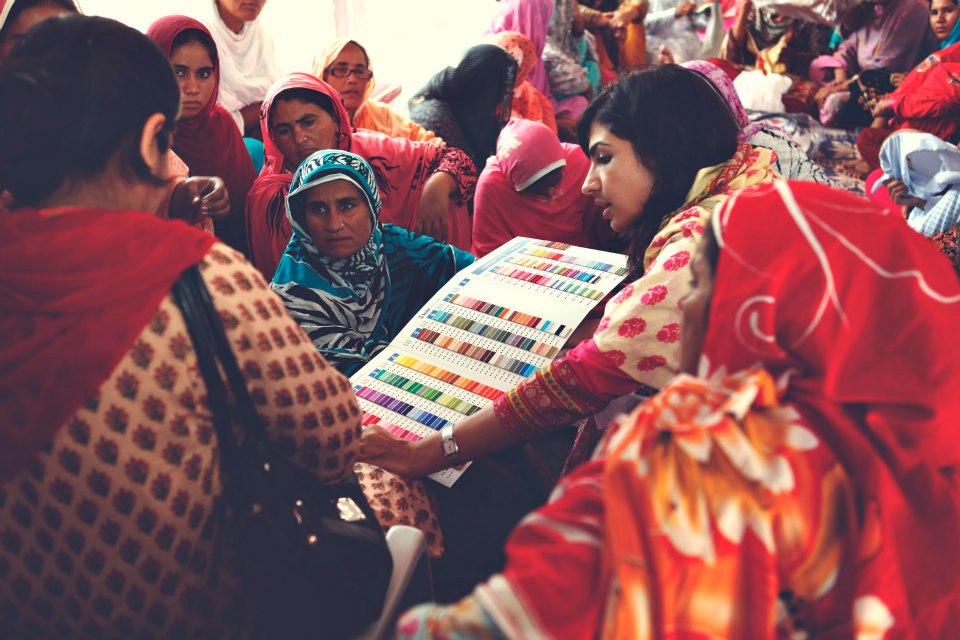Popinjay and Markhor setting ethical examples for modest fashion companies in Islamic economies
Photo: Popinjay Founder Saba Gul working with artisans to pick threads / Courtesy Popinjay
What does a startup need to go global? What are the differences between a local player and a global powerhouse? In many cases, it's all about values. At least that's the case with Markhor and Popinjay, two Pakistan-based e-commerce firms that have achieved global success in the past few years.
Markhor and Popinjay have very similar stories. Both are e-stores that were born out of the desire to solve a problem and raise awareness about a social issue, and not just to turn a profit.
Markhor is an online company that sells high-end handcrafted shoes. It first started in 2010 when one of its co-founders, Waqas Ali, became fed up with the fact that shoe craftsmen in his hometown, Okara, made so little money on a product that would later sell for thousands of dollars, with middlemen reaping most of the profits. He set out to solve this problem.
Around the same time, a not-for-profit organization called Bliss wanted to improve the living situation of low-income Pakistani women by giving them an avenue to share their skills with the world. What began with classes in embroidery and needlework, the results of which were turned into handbags, ultimately led to the for-profit online retail site Popinjay in the fall of 2013.
Both startups were built on the same foundation -- an antithesis to fast fashion that also responds to the demands of a growing market of consumers who are more aware about the origin of products they buy and do not want anything that might have been produced using unethical, unfair, or unlawful manufacturing practices, such as sweatshops.
Markhor provides information about its shoe craftsmen, including how much money each one makes for each pair of shoes sold. This level of transparency and insight into the manufacturing process cannot be gained from big-name brands such as Gucci, Coach or Louis Vuitton.
OVERCOMING HURDLES
Markhor and Popinjay also face the same root problem. In the market for luxury goods like shoes and handbags, middlemen hold most of the power.
Resellers and distributors end up taking most of the profits, as many retailers mark up luxury items 200 to 250 percent on the wholesale price.
In order to keep bag prices at a reasonable level, wholesalers would have to reduce their profit margins, which in turn limits what they are able to trickle down to craftspeople. Both companies have sought an answer to this problem in the same place: the Internet.
For Popinjay, the Internet was actually a last resort. Founder Saba Gul describes her experience as a "painfully slow and complete letdown" when first dealing with retail giant Anthropologie. When the traditional strategy fell through, Popinjay discovered the power of e-commerce.
Today Markhor and Popinjay bypass middlemen altogether and sell their products directly to customers. This allows them to both reduce prices for end users and increase wages for the manufacturing staff.
With a direct sales model, manufacturers are able to keep prices low while sill making enough of a profit to properly compensate their workers. This also gives a company more control over the supply chain, while quality control at every stage from production to delivery becomes easier.
For Markhor co-founder Waqas Ali, using the Internet to spread the word about his firm's products was a no-brainer. He started a Kickstarter campaign with a target of $15,000 but managed to rake in an astonishing $107,000 in April, 2015.
SETTING AN EXAMPLE
If there's one thing to be learned from the success of Markhor and Popinjay, it is that customers do not necessarily always invest in big name brands but in values.
By appealing to the humane side of their customers, both firms not only raised awareness but also contributed to solving serious issues in Pakistan. This made them stand out in the global market and appeal to a wider audience.
Markhor was the first startup from Pakistan to be accepted into Silicon Valley's renowned Y-Combinator accelerator program in 2015, and it ultimately received $120,000 in seed funding.
Popinjay now employs more than 150 women on its production team. It plans to diversify its product offering to include new accessories such as scarves, belts and even men's products in the future. It also has plans to open brick-and-mortar stores in Pakistan.
Copyright SalaamGateway.com 2016

Soham Adwani